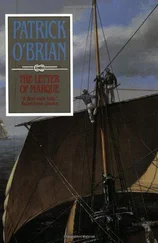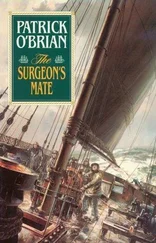Patrick O'Brian - The Ionian mission
Здесь есть возможность читать онлайн «Patrick O'Brian - The Ionian mission» — ознакомительный отрывок электронной книги совершенно бесплатно, а после прочтения отрывка купить полную версию. В некоторых случаях можно слушать аудио, скачать через торрент в формате fb2 и присутствует краткое содержание. Жанр: Книги. Описание произведения, (предисловие) а так же отзывы посетителей доступны на портале библиотеки ЛибКат.
- Название:The Ionian mission
- Автор:
- Жанр:
- Год:неизвестен
- ISBN:нет данных
- Рейтинг книги:3 / 5. Голосов: 1
-
Избранное:Добавить в избранное
- Отзывы:
-
Ваша оценка:
- 60
- 1
- 2
- 3
- 4
- 5
The Ionian mission: краткое содержание, описание и аннотация
Предлагаем к чтению аннотацию, описание, краткое содержание или предисловие (зависит от того, что написал сам автор книги «The Ionian mission»). Если вы не нашли необходимую информацию о книге — напишите в комментариях, мы постараемся отыскать её.
The Ionian mission — читать онлайн ознакомительный отрывок
Ниже представлен текст книги, разбитый по страницам. Система сохранения места последней прочитанной страницы, позволяет с удобством читать онлайн бесплатно книгу «The Ionian mission», без необходимости каждый раз заново искать на чём Вы остановились. Поставьте закладку, и сможете в любой момент перейти на страницу, на которой закончили чтение.
Интервал:
Закладка:
'Egrets,' said Stephen. 'And who else besides Pangloss?'
'Martineau and Egmont, as well as the Duroures. It is too many altogether. I was against it from the start. There is always the possibility of an indiscretion, an accident ^and gathering so many people, some of whom we hardly know, in such a place as this ... hush,' he whispered in an urgent voice, thrusting Stephen behind a clump of reeds, 'What is that?'
'Where?'
'On the corner, where the dyke turns to the left. It moves.'
In the shifting moonlight it was difficult to be sure of anything, but after a while Stephen said, 'I take it to be a gate-post with an owl upon it. There: the owl has flown. Pray put your pistol away.'
They walked on, Leclerc speaking of the organizers of this rendezvous with the waspish malignancy of a frightened man, and the gate-post proved to be in fact a lightning-blasted willow-tree. But they had scarcely passed it, they had scarcely turned the corner before there were shots in the marsh below them, a few hundred yards to the right. An exchange of shots from two separate places, orange stabs of flame in the darkness, crashing in a reed-bed over towards the road. A moment's stunned silence and Leolerc cried 'We are sold - betrayed,' and set off at a furious run towards the shooting-box.
Stephen slipped from the dyke and into the reeds, where he stood, listening intently. What he heard puzzled him: it was more the sound of a skirmish with both sides running off rather than that of a determined engagement or a pursuit. A good deal of sporadic shooting and then silence. An indistinct drumming sound, perhaps the galloping of horses a great way off, then nothing more. The clouds finally overcame the moon, and the night grew almost wholly dark.
The south wind, which had been blowing for some time in the higher regions of the air, now came in gusts across the marsh, making a noise like breakers in the tall reeds and bringing with it the first small sweeps of rain. The bittern began again, answered by another a great way off: Stephen pulled the hood of his boat-cloak over his head, against the drips.
When he had waited so long that it was certain that Leclerc was not coming back either on horse or foot Stephen climbed on to the dyke again. He now had to walk bowed against the strong south wind, but even so it was far below and he wanted to get away as soon as ever he could, back to the dunes before any organized search was possible.
Although he was worried by the thought that this wind might very soon work up such a surf that no boat could take him off, the deep and at times almost disabling dread that had been with him earlier had gone. It was less fear than anger, then, that he felt when he was walking along a stretch of dyke with water on either side of it and he saw a faint light ahead, a moving light but moving far too steadily for a will-o'-the-wisp and too clearly defined: almost certainly a lantern like his own, a dark-lantern slightly open.
He was unwilling to slip down into bare water of an uncertain depth, and there were no reed-beds for several hundred yards: indeed this was a singularly bare stretch, the only shelter being some stunted tamarisks. Rather than retreat, losing distance, he plunged into these, and with his hood drawn over his face to hide the whiteness, he crouched there waiting for the light to pass.
As it came nearer he became more and more convinced that it was carried by one man alone, not a party, and that this one man was not a soldier. His step was hesitant and slow, and sometimes he stopped altogether, though he did not appear to look round or search the marsh on either side.
Nearer, and Stephen lowered his eyes. A strong gust of wind, a squall of heavy rain, and clapping his hand to his hat the light-bearer stepped under the lee of the tamarisks and sat down. He was three yards from Stephen and a little beyond him; he sat there hunched with his back to the wind until the rain stopped as suddenly as it had begun. He stood up and they might well have passed if he had not suddenly sat down again, opening his lantern wide to inspect his naked foot. It was covered with mud, but as he wiped the dirt off with his handkerchief a red flow covered the white skin: he tried to staunch it with his neckcloth and in the reflected light Stephen saw Professor Graham's face, closed and hard with pain, but unmistakable.
CHAPTER EIGHT
Once again the flagship made the approaching Worcester's signal, requiring her captain to repair aboard; and once again Jack Aubrey sat primly on an upright chair in front of the Admiral's desk. But this time he did not sit so near the edge; his conscience was as clear as the pure Mediterranean sky; he had brought mail from Mahon as well as stores, and there was no hint of iciness in the great cabin.
'And so learning that the greater part of the spars had not arrived, sir,' he went on, 'I had the less scruple in complying with Dr Maturin's request that he should proceed to the French coast without delay. Fortunately the breeze served and I was able to set him ashore at the appointed place and time and to take him off the next morning, together with a wounded gentleman, the Mr Graham we carried out as far as Port Mahon.'
'Ah? Well, I am heartily glad you have brought Maturin back so soon: I was anxious for him. He is aboard? Very good, very good: I shall see him directly. But first tell me what they have sent us in the way of spars. I should give my eye-teeth for a comfortable supply of spars.'
Jack provided the Admiral with an exact, detailed account of the spars in question, and the Admiral gave Jack his views on the over-masting of ships, particularly of wall-sided ships, in the Mediterranean: or anywhere else, for that matter. While he was doing so, Dr Maturin and Mr Allen sat in the secretary's cabin, drinking marsala and eating Palermo biscuits. Stephen however was not reporting to Mr Allen - very far from it indeed -but rather offering remarks upon the unfortunate results of divided councils with his own recent expedition as an example. 'A better example you could not wish,' he said, 'for here you have a dark marsh with difficult, obscure paths - a pretty figure for this kind of warfare - and over these difficult obscure paths you have two bodies of men approaching one another in the black night, .both moving to much the same rendezvous, both actuated by much the same motives, but neither knowing of the other's existence - they blunder into one another - mutual terror, foolish terror, flight - and the utter ruin of at least one carefully elaborated plan, to say nothing of the suspicions of indiscretion if not of downright treachery that make the renewing of contact almost impossible.'
'The man Graham must be a great fool,' observed Allen, 'A busy, pernicious fool."
'I have expressed myself badly, I find,' said Stephen, 'I intended no reflection upon the individual, only upon a system that allows still another department of Government to set up an intelligence service of its own, working in isolation from the others and sometimes in its ignorance even directly against them. No, no: Professor Graham has shining parts. He was the gentleman responsible for the capitulation of Colombo, which made such a noise in its time.'
Allen was a newcomer to Intelligence in this restricted sense and he looked surprisingly blank for so clever a man; his lips silently formed the word Colombo twice; and Stephen said, 'Allow me to refresh your memory. When that Buonaparte seized Holland we seized, or attempted to seize, the Dutch possessions abroad, including of course those in Ceylon. The fortification of Colombo, the key to the whole position, threatened to present insuperable difficulties, particularly as the garrison was Swiss; for as the world in general knows the Swiss, if duly paid, are not easily dislodged nor yet bribed, persuaded, or overawed. Furthermore, the place was commanded by Hercule de Meuron, a Swiss officer of the most eminent military genius. But he was also an acquaintance of Mr Graham's, a close acquaintance as I understand it, even an intimate. Graham proceeds to Colombo disguised as a Turk, enters into contact with Meuron by means of a message concealed - elegant stroke -in a Dutch cheese - reasons with him - convinces him - the Swiss march out, the English march in, and Buonaparte is denied the resources of Ceylon. What means Graham used I do not know, but I am morally certain that it was not money."
Читать дальшеИнтервал:
Закладка:
Похожие книги на «The Ionian mission»
Представляем Вашему вниманию похожие книги на «The Ionian mission» списком для выбора. Мы отобрали схожую по названию и смыслу литературу в надежде предоставить читателям больше вариантов отыскать новые, интересные, ещё непрочитанные произведения.
Обсуждение, отзывы о книге «The Ionian mission» и просто собственные мнения читателей. Оставьте ваши комментарии, напишите, что Вы думаете о произведении, его смысле или главных героях. Укажите что конкретно понравилось, а что нет, и почему Вы так считаете.












